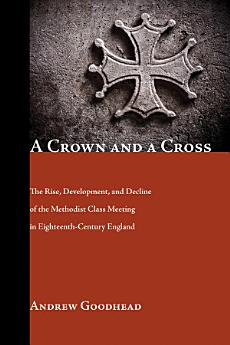A Crown and a Cross: The Rise, Development, and Decline of the Methodist Class Meeting in Eighteenth-Century England
Andrew Goodhead
Apr 2010 · Wipf and Stock Publishers
Ebook
362
Pages
family_home
Eligible
info
reportRatings and reviews aren’t verified Learn More
About this ebook
This book critically reviews the origins, development, and decline of the Class Meeting. Beginning with an overview of the religious and societal milieu from the sixteenth century, and examining the heritage of John and Charles Wesley, the inheritance John Wesley took from the past is studied. The rise of the Anglican Unitary Societies is considered and Wesley's active work within those societies drawn out. The arrival of the Moravians in London in 1738 to form a group for Germans resident in London influenced many of the Anglican society members, not least the Wesley brothers. These influences are also considered before the Methodist movement, and particularly the Class Meeting are considered in detail. This book is unique in its drawing together the manner of religious association experienced in the Evangelical Revival and aims to show how Methodism was a fusion of pre-existing ideas, formed into a new working model of religious association. Paramount to the success of the early Methodist was the Class Meeting. This book draws on testimony, diary, and journal records to provide first-hand accounts of people's lives being changed through attendance at the Class Meeting and its making possible growth in grace and holiness. In the early period of Methodism the Class Meeting was the crown to Methodist identity. An analysis of the primary aims of this meeting, which gave the Methodist people their distinct characteristics, is followed by a study of the social identity and group processes that occurred when prospective members considered joining the Methodists. The decline of the Class Meeting to 1791 forms the concluding chapters, and, using three classic sociological models-Weber (routinisation), Durkheim (totemism), and Troeltsch (primary/secondary religion)-as themes, the reasons why the class became a cross are examined. Journal, diary, and testimonial material support the Methodists' declining interest in the class that led to its irrelevance for a people seeking respectability rather than an immediate encounter with God.
About the author
Andrew Goodhead is a British Methodist Minister. He is presently Spiritual Care Lead at St Christopher's Hospice, Sydenham, London. He has served as a Circuit Minister and Superintendent Minister in Circuits in England and Scotland.
Rate this ebook
Tell us what you think.
Reading information
Smartphones and tablets
Install the Google Play Books app for Android and iPad/iPhone. It syncs automatically with your account and allows you to read online or offline wherever you are.
Laptops and computers
You can listen to audiobooks purchased on Google Play using your computer's web browser.
eReaders and other devices
To read on e-ink devices like Kobo eReaders, you'll need to download a file and transfer it to your device. Follow the detailed Help Center instructions to transfer the files to supported eReaders.





